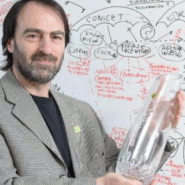El coordinador de campaña de Bosques en Greenpeace es la voz en contra de la deforestación, los incendios intencionales y el recorte del ecosistema de la fauna nativa que los habita. Radiografía de un referente ineludible para hablar de lucha ambiental en el cono Sur.
Hernán Giardini encarna la voz de los bosques nativos. Desde hace exactamente 20 años, su figura se asocia a la defensa ambiental en Argentina y la región, al ser el coordinador de campañas en torno a la temática por parte de Greenpeace.
Licenciado en Ciencias de la Comunicación por la Universidad de Buenos Aires (UBA) y periodista, integró el activismo a su perfil profesional casi desde el inicio. Antes de formar parte de la organización, colaboró con la comunicación de movimientos sociales, fábricas recuperadas y organizaciones campesinas e indígenas.Esta experiencia moldeó su enfoque en la articulación territorial.
Su ingreso a Greenpeace fue a partir de una convocatoria del área de política e investigación, en donde vio la oportunidad de integrar todas sus inquietudes profesionales y poner al servicio del activismo su don de saber comunicar.
Desde entonces, diseña las estrategias y ejecuta las campañas públicas de la organización, actuando como vocero ante medios, empresas, legisladores y gobiernos. Además, lidera investigaciones, articula las campañas con otras organizaciones para aunar fuerzas y coordina también movimientos sociales.
La Ley de Bosques, hitos y desafíos
La sanción de la Ley Nacional de Bosques en 2007 marcó un punto de inflexión en la protección ambiental argentina. Giardini tuvo un papel crucial en este logro. Su labor se enfocó en la articulación con organizaciones locales, campesinas e indígenas. Este trabajo conjunto permitió generar presión en las provincias y el Congreso, que impulsó la aprobación de la normativa.
«Hubieron 175 notas en un mes y medio… 93 fueron en medios masivos nacionales y provinciales, todo para dar a conocer el tema“, cuenta Giardini.
Más tarde, reafirmó su compromiso con la implementación de la ley, formando parte de la gestión que derivó en la sanción de leyes provinciales de bosques en Santiago del Estero, Salta y Chaco.
Sin embargo, la ley de Bosques, sigue enfrentando desafíos de envergadura. Giardini y su equipo suelen lidiar con la falta de voluntad política para frenar la deforestación y por ello sigue empujando la necesidad de modificar la normativa para fortalecer su aplicación. «Ya se ve en algunas provincias un efecto contagio de flexibilización de cuestiones ambientales, se ve persecución, por ejemplo, a pueblos indígenas», advierte Giardini.
La deforestación en Argentina es un problema acuciante. Más de la mitad de los desmontes son ilegales. Y la alerta de Greenpeace para descubrirlos es constante. Bajo la coordinación de Giardini, los reportes anuales con datos concretos son clave para detener la pérdida de bosques y la impunidad de los delitos ambientales.
De esta manera, podríamos decir que el impacto de la labor de Hernán Giardini en Greenpeace tiene un reflejo unívoco en cifras concretas y acciones clave. Además de sus acciones en favor de la visibilización de la problemática en torno a los bosques, logró sumar 1.5 millones de firmas para la Ley de Glaciares (Ley 26.639). Una norma emblemática porque, sancionada en 2010, fue establecer el Régimen de Presupuestos Mínimos para la Preservación de los Glaciares y del Ambiente Periglacial.
Esto fue un avance significativo, porque además prohibió actividades industriales como la minería e hidrocarburos en estas zonas, reconociendo su rol fundamental como reservas estratégicas de agua dulce.
Por otro lado, y como hito judicial, nos podemos referir a la denuncia presentada ante la Corte Suprema en 2019 por el desmonte en Chiguayante, buscando visibilizar la impunidad de los delitos ambientales.
Otra muestra de que Giardini mantiene una filosofía de trabajo centrada en la articulación territorial y en adaptar la comunicación a un escenario mediático fragmentado, buscando conectar con nuevos públicos, como actores clave de concientización del gran público, siempre con foco en la preservación y el futuro.
En su visión, los desafíos por venir incluyen la presión de sectores reaccionarios y la necesidad de una mayor voluntad política para la aplicación efectiva de las leyes ambientales vigentes.
Sobre su trayectoria, podríamos decir que si bien la campaña de bosques es su principal foco, Giardini su rol también se destacó en las gestiones por la Ley de Glaciares.
En esta iniciativa, su rol incluyó la articulación con las provincias, la vocería y la elaboración de un informe sobre el impacto de la actividad minera en los glaciares. Aunque considera que el protagonismo de Greenpeace en esta ley fue menor comparado con la de Bosques, reconoce el peso de las asambleas socioambientales y su aporte en ello.
Sin dudas, en medio un escenario mediático fragmentado y un contexto político adverso, la relevancia de un rol con claras habilidades en la comunicación eficiente y estratégica es innegable. Aunque, por supuesto, el desafío resulte mayor.
Una mirada transversal
Giardini no solo se limita a la defensa de los bosques. Es periodista especializado en temas socioambientales e indígenas. Su trayectoria en radio es extensa: desde 1997 participa como productor y conductor en varias emisoras. Actualmente, coordina Radio Piuke en Bariloche, donde también produce y conduce un noticiero.
En prensa gráfica,escribió columnas de opinión sobre deforestación en medios masivos. También fue director periodístico y redactor de la revista digital Contracultural.
Su incursión en el ámbito audiovisual incluye la dirección del documental “Viaje a la tierra de los Sin Tierra” en 2004, y roles de productor.
Su compromiso social se extiende a colaboraciones con diversas organizaciones y espacios, desde la Organización Ecologista Piuke hasta movimientos campesinos y culturales. Estas experiencias enriquecen su visión integral de los problemas sociales y ambientales.
El hombre detrás del activista
Desde hace 12 años, Giardini reside en Bariloche, Río Negro. Su vida personal se entrelaza con su pasión por la naturaleza. Es un amante de los bosques y las montañas, donde practica trekking. La música también es parte de su vida, con diez años de clases de percusión. Otra de sus pasiones es viajar.
La lucha de Giardini desde su rol estratégico en Greenpeace se da en un contexto complejo. El 95% de los incendios forestales son de origen humano. La situación de los bosques, agravada por el cambio climático y la sequía, exige una respuesta gubernamental más decidida, enfocada en la prevención y la penalización de los delitos ambientales.
El riesgo de un retroceso en las regulaciones ambientales son preocupaciones para el futuro del activismo. Y ante este panorama, Giardini y Greenpeace buscan adaptar sus estrategias de comunicación, con el objetivo de llegar a públicos específicos, convocando a quienes quieran trabajar por un futuro mejor.
Giardini le hace frente a un panorama complejo. El activista lo describe con crudeza. «La pandemia no fue un cachetazo lo suficientemente fuerte para generar un cambio sistémico. Ha contribuido a un individualismo post pandémico que dificulta la acción colectiva en temas ambientales», señala. Aun así, insiste en su labor.
Hernán Giardini dedica sus esfuerzos a «refrescar», «renovar la campaña» y «contar algo nuevo» todos los días para adaptarse al escenario cambiante. De esta manera, con su persistencia y compromiso, se mantiene como una figura clave en la defensa del patrimonio natural de la región. Su trabajo es un recordatorio de la necesidad de proteger lo más sagrado, la naturaleza. Sobre todo a los bosques, los pulmones del planeta.








